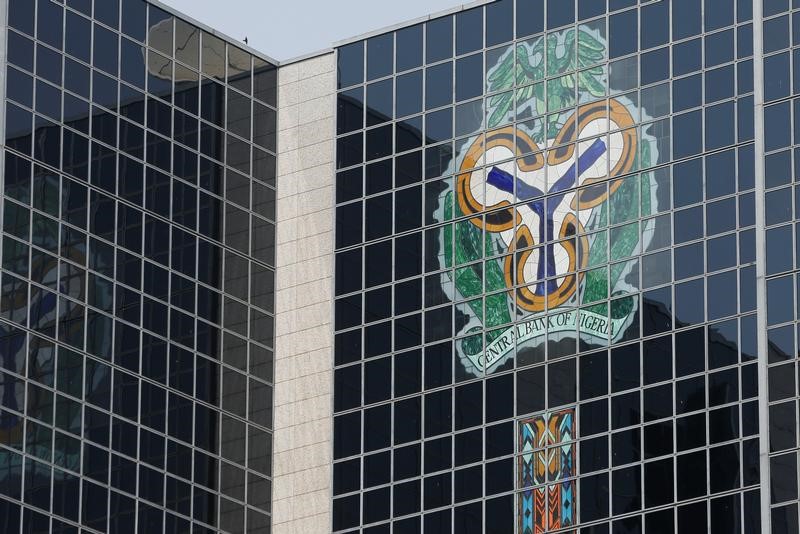By Chijioke Ohuocha
ABUJA, March 29 (Reuters) - Nigeria is keeping control of
its naira NGN=D1 currency despite demands for deeper reforms
from the International Monetary Fund and World Bank and
complaints from businesses.
The multilateral institutions say a free-floating naira
would help the economy withstand future shocks. But Nigerian
authorities fear inflation stemming from a sharp devaluation
could throw millions into poverty.
Last week, central bank governor Godwin Emefiele denied the
country was adopting a new foreign exchange management policy,
while vice president Yemi Osinbajo said the government would
itself use a more flexible rate. What is happening to the naira, and why? Here are some key
facts about Nigeria's currency and recent monetary policies:
WHAT'S PRESSURING THE NAIRA?
The COVID-19 pandemic and oil price crash hammered Africa's
largest economy, 90% of whose foreign exchange earnings come
from oil exports, pushing it into its second recession in four
years.
It narrowly exited the recession in the fourth quarter, but
the drop in oil revenues led to a balance of payments deficit of
$14 billion last year and has depleted its foreign reserves.
WHAT'S AT STAKE?
The government of President Muhammadu Buhari, who took
office in 2015, has kept the currency artificially high as a
matter of national pride.
During the last oil price crash, in 2016, the Nigerian
central bank created a system of multiple exchange rates in
order to avoid a large official devaluation. These included a
market-determined rate for investors and exporters called the
Nigerian Autonomous Foreign Exchange Rate Fixing (NAFEX).
Faced with a 5.6 trillion naira ($15 billion) budget deficit
this year, the government is seeking a $1.5 billion loan from
the World Bank. But in return, the World Bank wants Nigeria to
do more to bring the official exchange rate of 381 naira per
dollar and other rates, including NAFEX, into line.
HAS THE CENTRAL BANK DONE SO FAR?
Nigeria's central bank devalued the naira's official rate
twice last year and has weakened the exchange rate for retail
users.
The bank has continued to gradually adjust the currency
since the devaluations, limiting dollar access for imports and
implementing restrictive forex policies to support the naira.
After oil prices crashed in 2014-16, Nigeria raised interest
rates to attract investors. But when crude prices plunged last
year and foreign money fled, the central bank reduced yields on
treasury bills in order to boost naira liquidity.
HOW HAS THE NAIRA POLICY AFFECTED INVESTMENT?
The naira's value and issues with dollar liquidity are major
deterrents to business and investment in Nigeria. Twelve-month non-deliverable forward contracts quote the
dollar at 465 naira, which implies the local currency is
currently overvalued by around 18%. Patrick Curran, senior
economist at emerging markets consultancy Tellimer, said that
essentially guarantees a loss on investment when the currency is
forced to adjust, unless returns exceed the overvaluation.
Nigeria's debt is among Africa's lowest-yielding, which the
government is counting on as it seeks to cover this year's large
financing needs via cheap local borrowing.
But historically low yields mean renewed inflows will be
deterred even if the currency issues are resolved, said Samir
Gadio, head of Africa strategy at Standard Chartered Bank.
Foreign investors have dumped local assets because of the low
yields.
WHAT NEXT?
The central bank has offered cheap credit to try to boost
manufacturing and agriculture in order to cut imports. It has
also eased rules on diaspora remittances to increase dollar
liquidity, after the naira fell sharply on the black market.
Those measures have not boosted the economy so far,
however, and Tellimer's Curran said the central bank has
"effectively sacrificed growth at the altar of naira stability".
"This policy has failed to accomplish the stated goal of low
and stable inflation, and instead has exacerbated price
increases via FX shortages and parallel market depreciation,"
Curran added.
Without a significant oil price rebound, analysts say the
cost of imports and of meeting offshore debt obligations will
further deplete Nigeria's dollar reserves.
($1 = 380.70 naira)
<^^^^^^^^^^^^^^^^^^^^^^^^^^^^^^^^^^^^^^^^^^^^^^^^^^^^^^^^^^^
Oil price crash battered Nigeria's foreign reserves https://tmsnrt.rs/39nCfN4
Wide forex gap despite devaluations https://tmsnrt.rs/3fkZRW7
Nigeria's inflation hit four-year peak in February https://tmsnrt.rs/3sCo0LK
Official naira rate well below black market https://tmsnrt.rs/3flVyKn
^^^^^^^^^^^^^^^^^^^^^^^^^^^^^^^^^^^^^^^^^^^^^^^^^^^^^^^^^^^>
